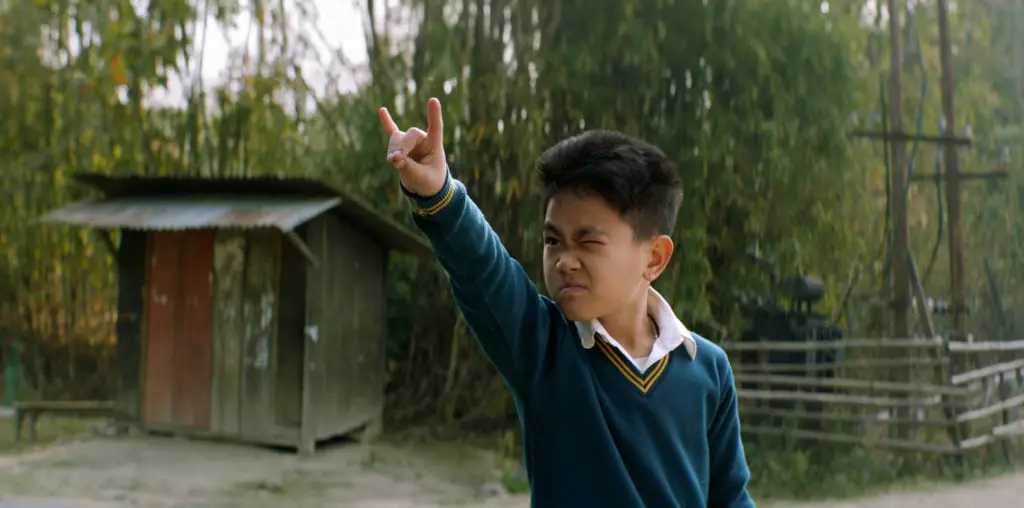
The film opens on a shot, fittingly enough, of a strange circus where the main act is the decapitation of a willing audience member. The ringmaster asks if anyone has the guts to go through with it. A young girl stands up and volunteers; but before she goes under the blade, she tells us what has led her to this place.
Circus is a madman’s journey through every possible level of storytelling: symbolic, surreal, imaginary, fictional and realistic. It opens in a dream, and then switches to an all too possible tale of a 12 year old kid named Mitsuko who is the victim of incest, insanity and abuse at the hands of her father Gozo and mother Sayuri. Then it becomes a mystery about crippled novelist Taeko (a twin to the now adult Mitsuko, whom we also meet along the way.) as she is in the middle of writing a book about a child named Mitsuko who is being abused by her parents.
All of which begs the following questions: Is the adult Mitsuko trying to deal with her abuse by pretending that she’s a novelist and that her past is just a book she’s writing? Or, is Taeko a hallucination that the little girl is having? Or maybe Taeko’s real and Mitsuko is the one who is fake? Or maybe…?
The amazing thing about Sion Sono’s film, which folds back onto itself so many times that it threatens to collapse the very fabric of all existence, is that an audience paying attention doesn’t lose track of the plot. No matter how weird things get it’s always coherent and we always know that we’re being shown something that is “really” happening, albeit shaded behind denial and mental illness and wishful thinking. Sono’s playing by his own rules perhaps, but he’s still playing fair. When the ending comes, it doesn’t elicit “WTF?” but “Oh! I get it!”
When we’re first introduced to Mitsuko, the little girl tells us that her father’s frequent rapes made her feel as if she was becoming her mother. A conclusion which holds a weird logic; especially when her mother says: “You’re going to look exactly like me when you grow up.” After all, both mother and daughter technically now occupy the same place in the father’s life. So, why wouldn’t they become the same person?
Actress Masumi Miyazaki is fantastic in the quadruple role; she plays Sayuri the mother, Mitsuko as a grown up, Mitsuko as a child pretending to be her mother, and Takeo the writer. Giving each part a totally different feel: Sayuri is a jealous and submissive woman who’s crazed by the thought that her daughter is getting more attention than she is, “Young” Mitsuko is a quiet and unhappy and still very much a confused kid despite her fantasy of being grown up, adult Mitsuko is a hurricane of emotional turmoil and Taeko is self-confident and just a little bit crazy, with a touch of vulnerability and insecurity beneath her hard exterior.
Another role worth noting is Issei Ishida as Yuji, Taeko’s assistant at her publishing house. Ishida plays an almost perfect representation of the Japanese Asexual Gai Boi stereotype, yet infuses it with a kind of manic humor that transcends all that and reminds you in a weird way of a darker Pee-Wee Herman that you’d only meet long after midnight. Yuji’s part in the film is initially tiny but as we get closer to the ending it gradually swallows up the whole production until we realize that he may be an essential piece of the puzzle about the reality behind Mitsuko/Takeo.
The film does take a while to pick up. For about 30 minutes you’d think you were watching an odd but good version of Mommy (and Daddy) Dearest. Then the subplot (or is it the main plot?) about novelist Taeko kicks in and we’re thrown into a completely different film where we suddenly realize that the child Mitsuko may not have been totally honest about all the events that happened to her and that this doppelganger of hers Taeko may be even be more deluded.
Strange Circus accomplishes what David Lynch tried and failed, in my opinion, to do with Mulholland Dr. Tell a story about one thing by telling us a different story about something else, and letting the original kind of poke through the veil occasionally, clueing us in that all is not as simple as it seems. While the Lynch movie completely falls apart by the end and becomes weird for the sake of being weird, Circus is always coherent if not a little, pardon the pun, strange.
Now I see why about 200 hundred people rushed to get Sono’s autograph after the showing at the Fantasia festival in Montreal. The guy’s good, real good.
